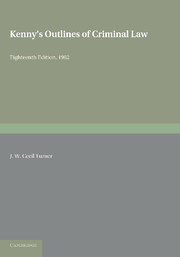Book contents
- Frontmatter
- Preface to the Sixteenth Edition
- Preface to The Seventeenth Edition
- Preface to the Eighteenth Edition
- Contents
- Index of cases
- Index to the principal statutes
- List of principal books cited
- BOOK I GENERAL CONSIDERATIONS
- CHAPTER I CRIME AND CRIMINAL LAW
- CHAPTER II PRINCIPLES OF CRIMINAL LIABILITY
- CHAPTER III VARIATIONS IN LIABILITY
- CHAPTER IV PRELIMINARY CRIMES
- CHAPTER V THE POSSIBLE PARTIES TO A CRIME
- CHAPTER VI THE CLASSIFICATION OF CRIMES
- BOOK II DEFINITIONS OF PARTICULAR CRIMES
- BOOK III MODES OF JUDICIAL PROOF
- BOOK IV CRIMINAL PROCEDURE
- Appendix I The meaning of ‘credit’
- Appendix II II Rules as to admission of evidence which reveals to the jury facts discreditable to the person accused
- Appendix III III Forms of indictment
- Index
CHAPTER IV - PRELIMINARY CRIMES
from BOOK I - GENERAL CONSIDERATIONS
Published online by Cambridge University Press: 05 June 2016
- Frontmatter
- Preface to the Sixteenth Edition
- Preface to The Seventeenth Edition
- Preface to the Eighteenth Edition
- Contents
- Index of cases
- Index to the principal statutes
- List of principal books cited
- BOOK I GENERAL CONSIDERATIONS
- CHAPTER I CRIME AND CRIMINAL LAW
- CHAPTER II PRINCIPLES OF CRIMINAL LIABILITY
- CHAPTER III VARIATIONS IN LIABILITY
- CHAPTER IV PRELIMINARY CRIMES
- CHAPTER V THE POSSIBLE PARTIES TO A CRIME
- CHAPTER VI THE CLASSIFICATION OF CRIMES
- BOOK II DEFINITIONS OF PARTICULAR CRIMES
- BOOK III MODES OF JUDICIAL PROOF
- BOOK IV CRIMINAL PROCEDURE
- Appendix I The meaning of ‘credit’
- Appendix II II Rules as to admission of evidence which reveals to the jury facts discreditable to the person accused
- Appendix III III Forms of indictment
- Index
Summary
Section I. Introductory
In all crimes, other than those brought about by omission to perform a legal duty, some active conduct, whether brief or prolonged, on the part of the offender must precede his attainment of the actus reus. This preparatory activity consists in a series of steps taken in furtherance of his ultimate aim, and any one of these steps may be (although none need be) in itself an independent, completed, crime. Thus a man, having formed the intention to murder another, may commit the misdemeanour of malicious damage to property by breaking open a cupboard, the felony of larceny by taking from it a revolver and ammunition, an offence under the Road Traffic Act, 1930, by driving off another's motor vehicle to reach his victim, and the felony of attempt to murder by firing a shot at him which misses. Of the crimes thus committed three are independent and complete, for any one of the three might have been committed as an end in itself. But the crime of attempt is preparatory in its nature for it can have no existence except as part of a larger purpose. Attempt therefore may be classed as one of the three crimes which are essentially preliminary, the other two being incitement and conspiracy. For each of these crimes is effected as a means of reaching a desired end. High treason is the one crime (in its chief classes) to which none of these three offences can be ancillary, for acts which would constitute either an incitement or a conspiracy or an attempt to commit treason are treated as overt acts of treason and are therefore prosecuted as treason. These preliminary crimes have sometimes been erroneously described as ‘inchoate’ offences. This is misleading because the word ‘inchoate’ connotes something which is not yet completed, and it is therefore not accurately used to denote something which is itself complete, even though it be a link in a chain of events leading to some object which is not yet attained.
- Type
- Chapter
- Information
- Kenny's Outlines of Criminal Law , pp. 93 - 102Publisher: Cambridge University PressPrint publication year: 2013



